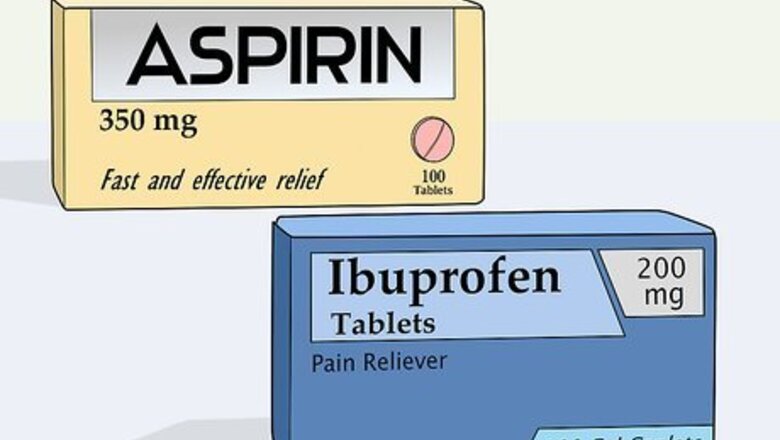
views
- Your sinuses rest right above your upper gum line, and if your sinuses become inflamed or irritated, they can put pressure on the nerves inside your upper gums and cause tooth pain.
- You can typically tell you have sinus-related tooth pain if you feel congested and your upper molars generally feel sore (as opposed to a single tooth irritating you).
- Treat sinus-related tooth pain the same way you’d treat regular tooth pain; use a cold compress to sooth pain directly, try a saltwater gargle to keep your mouth comfortable, and use a benzocaine numbing gel to keep your gum pain in check.
- If you don’t treat your sinus issues, your tooth pain probably isn’t going to go away.
- If your sinuses don’t clear up in a few days or so, visit a doctor to get a diagnosis—they may be able to prescribe you something specific to your condition that will clear out the congestion.
Getting Quick Pain Relief
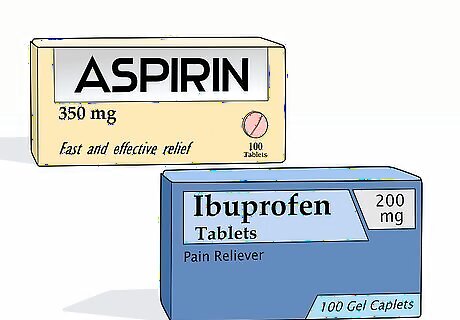
Take over-the-counter (OTC) pain reliever. One of the fastest ways to relieve toothache pain is to take ibuprofen, acetaminophen, or aspirin. Keep in mind that ibuprofen and aspirin also reduce inflammation, which could relieve sinus pressure that's making your teeth ache. Follow the manufacturer's dosing instructions and don't take more pain reliever than is recommended in a 24-hour period.

Apply a topical benzocaine gel to numb around your aching teeth. Buy an OTC numbing gel and squirt a pea-sized amount onto your clean fingertip. Rub the gel around the base of your teeth near the gum line so you get instant pain relief. You can use most topical gels up to 4 times a day, but remember to read the manufacturer's directions. If you don't want to use your fingertip, squeeze the gel onto the end of a cotton swab.
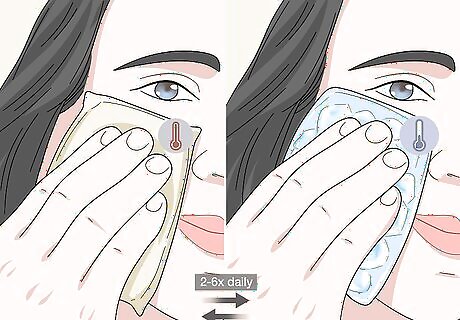
Alternate hot and cold therapy 2 to 6 times a day to ease the pressure. If you feel a dull, thudding ache in your teeth caused by inflammation, press a small hot compress against the outside of your cheeks near your sinuses. Hold it there for 3 minutes. Then, switch to a cold compress and press it against your sinuses for 30 seconds. Continue to alternate the hot compress with the cold compress 2 more times. You can do the hot and cold therapy up to 6 times a day to soothe your sinuses. To make a hot compress, fill a clean sock with dry rice and seal the end shut. Microwave it for 1 minute or until it feels hot. To make a cold compress, wrap a bag of ice or frozen food in a kitchen towel.
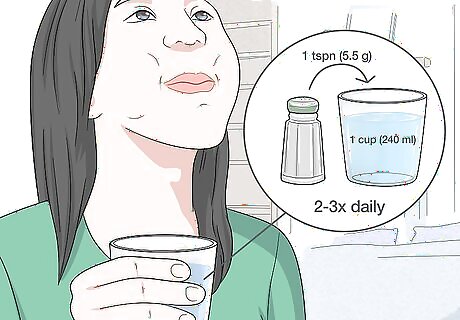
Gargle a saltwater rinse 2 to 3 times a day to temporarily relieve the pain. Mix 1 teaspoon (5.5 g) of salt into 1 cup (240 ml) of warm water until the salt dissolves. Then, take a large sip of water and swish it around your mouth for 30 seconds. Spit it out and repeat this a few times a day whenever you feel tooth pain. Avoid drinking the saltwater solution since this could give you an upset stomach.

Put clove oil onto a cotton ball and place it against your aching teeth. For a natural anesthetic, put 2 drops of clove oil on a clean cotton ball and press it against the aching teeth. Keep in there until you don't feel pain. Then, remove the cotton ball.Tip: Don't pour clove oil directly onto your aching teeth because you could accidentally ingest too much oil. You can buy clove oil from most natural markets, health food stores, or online.
Reducing Sinus Inflammation

Drink fluids throughout the day to stay hydrated. In order for your sinuses to drain and reduce pressure on the roots of your teeth, drink 1 glass of water every 1 to 2 hours during the day. The fluids help thin your mucus, which reduces swelling. Avoid drinking caffeine or alcohol because these can dehydrate you.
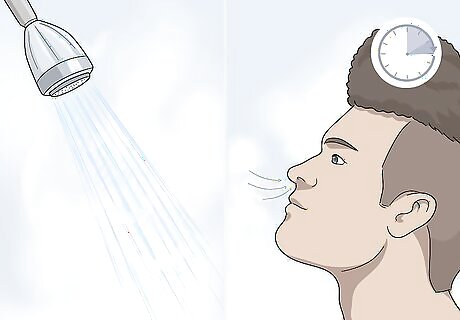
Breathe in steam for 10 to 15 minutes to open your nasal passages. Run a hot shower to create a steamy environment in your bathroom. Step into the shower and take deep breaths through your nose so the steam moisturizes your nasal passages. The steam can loosen mucus so your sinuses drain easier. This relieves pressure on the roots of your teeth. If you don't want to take a shower, bring a large pot of water to boil. Turn off the heat and drape a clean towel around your head. Then, carefully lower your head so it's 1 foot (30 cm) above the water and the towel traps the steam. Breathe in the steam for 10 minutes.
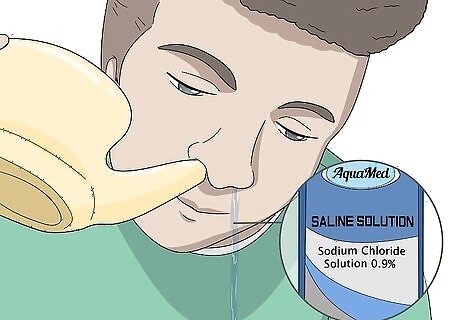
Flush out your sinuses with a saline solution. Encourage sinus drainage by irrigating your nasal passages. Fill a neti pot or clean bulb syringe with saline solution. Tilt your head to the side and insert the tip of the pot or syringe into your nostril. Then, squeeze or pour the solution so it goes through your nostril and out the other side. Repeat this with the other nostril. If you use a neti pot, it's important to use distilled or boiled and cooled water to prevent infection. Thoroughly clean the pot or bulb syringe with soapy water once you've finished using it. Then, let it dry completely.

Try taking antihistamines if your sinus infection is caused by allergies. If your sinuses become inflamed during allergy season, take OTC antihistamines. These can prevent allergies from irritating your sinuses and nasal passages. Keep in mind if something else is causing the sinus infection, taking antihistamines could dry up your mucus, making it harder for your sinuses to drain. If your seasonal allergies cause sinusitis, consider getting an allergy shot. This can prevent your sinuses from flaring up.

Take OTC decongestants for 1 or 2 days to reduce swelling. Use decongestant pills, sprays, or liquids to narrow the blood vessels around your sinuses. This can reduce pressure on the roots of your teeth, which relieves the toothache. Don't take decongestants for more than a few days or they could actually make you more congested.
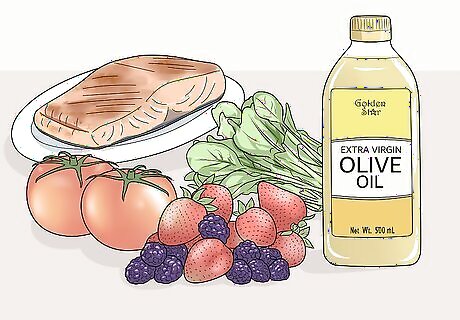
Eat foods that reduce inflammation. If you frequently get sinus infections, change your diet to include healthier foods that limit inflammation. Try to eat a few of these every day:Tip: Avoid eating foods that make inflammation worse. These include fried foods, red meats, refined carbohydrates, sugary beverages, and saturated fats. Tomatoes Olive oil Leafy green vegetables, such as spinach or kale Nuts, such as almonds or walnuts Fatty fish, such as salmon, tuna, or mackerel Fresh fruits, such as cherries, berries, or oranges
Getting Medical Attention
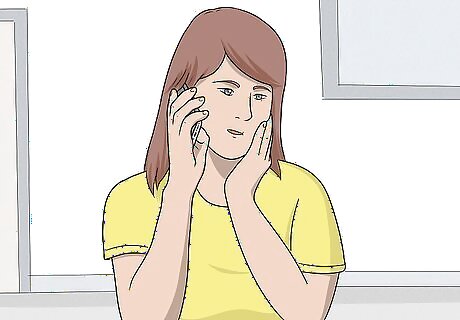
Contact your dentist if the pain gets worse or lasts more than 2 days. Most sinus problems clear up quickly once you reduce inflammation, but if your toothache feels more painful or doesn't go away after your sinuses clear up, call your dentist. Many dentists leave a few appointments open for last-minute scheduling so you can get in quickly. If you can't get an appointment with your dentist, see if you can get an appointment with your doctor instead.

Get a dental exam to rule out other causes of toothache. Your dentist will ask you about which teeth are painful and whether or not you feel pressure near your sinuses. If they don't think sinusitis is causing the toothache, they might do X-rays and examine your teeth for:Tip: If your dentist finds a different cause for your toothache, follow their treatment plan. For example, you may need a root canal or fillings. Tooth decay Cracks Fractures Infection
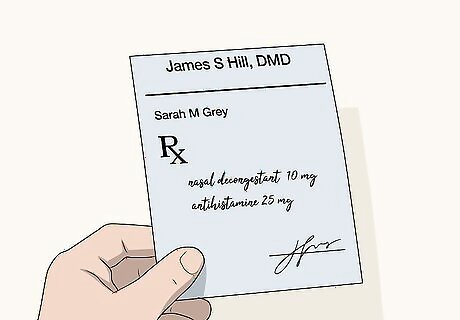
Take prescription medication to treat a sinus infection. If you've tried to reduce sinus inflammation at home without success, your doctor might need to prescribe a stronger medication for you. For example, you may get antibiotics if your sinus infection is severe and caused by a bacterial infection. Your doctor might write you a prescription for stronger decongestants or antihistamines. Feel free to follow up with your doctor if the pain doesn't go away or if your symptoms change. Your toothache may actually be caused by several health conditions.




















Comments
0 comment